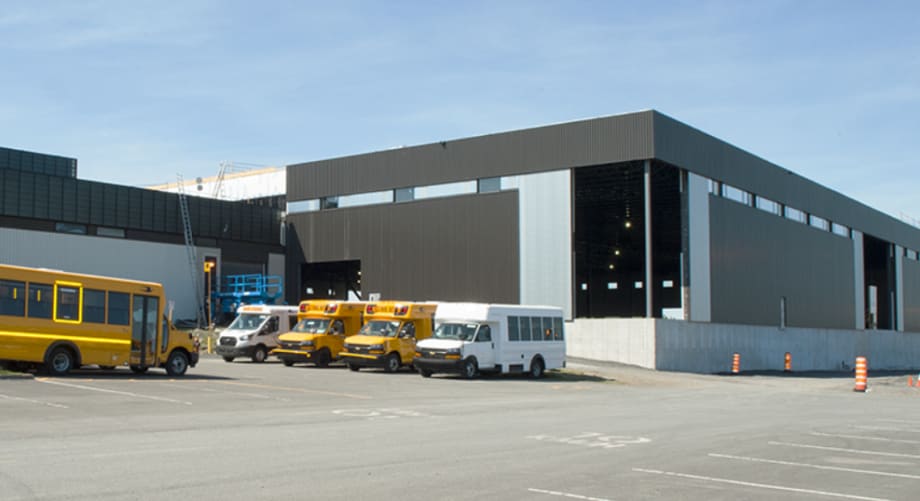DRUMMONDVILLE, Quebec — Type A school bus manufacturer Micro Bird has invested in a significant expansion of its bus plant to boost efficiency while reducing its carbon footprint.
The expansion, which includes an additional section of 115,000 square feet, began in November 2019. The new plant section is primarily comprised of a warehouse, which Micro Bird is building to help expedite bus production.
The goal of the expansion is to relocate Micro Bird’s warehouse, which is currently a few miles away from the assembly plant. The new section, which is adjacent to the manufacturer’s current plant, will bring Micro Bird’s warehouse in-house. The move will improve logistics by providing quicker and easier access to parts.
It will also enable the manufacturer to perform post-production procedures and maintenance services it currently contracts to local vendors, such as bus washing, custom painting, wheel alignments, and various other chassis and body customizations in an effort to deliver a turnkey solution to customers.
“The ability to handle 100% of our processes under one roof will enable us to build vehicles 70 % faster, from start to finish, and raise quality to new levels, reinforcing our leadership for exemplary standards in our market segments,” Steve Girardin, president of Micro Bird, told School Bus Fleet.
The consolidation of the warehouse will significantly reduce greenhouse gas emissions by about 35 tons per year by eliminating the transportation of parts coming from our remote warehouse, he added.
Additionally, as a greener way of heating the new building section, Girardin said, Micro Bird has implemented a construction method to capture free radiant heat from the sun. That method entails creating a space behind the walls where the air circulates, while dark panels on the wall’s surface heat the air before it enters the plant.
The decision to invest in the expansion was prompted by Micro Bird’s desire to provide even better service to customers as their needs evolve by becoming even more efficient, Girardin said.
“We will greatly improve our efficiency and expedite the build process while reducing our carbon footprint,” he added.
Although the expansion will generate significant efficiencies, Micro Bird plans to maintain its 500-plus employees due to the integration of new services and capabilities which it has historically contracted to local vendors.
The school bus manufacturer plans to move into the new section of the plant in October 2020.Over the last few years, the entire Micro Bird team has been hard at work envisioning and preparing for this expansion, Girardin said.
“The culmination of this project will be a great showcase of our team’s innovations and resilient commitment to honor the trust our customers and partners bestow upon us,” he added.














